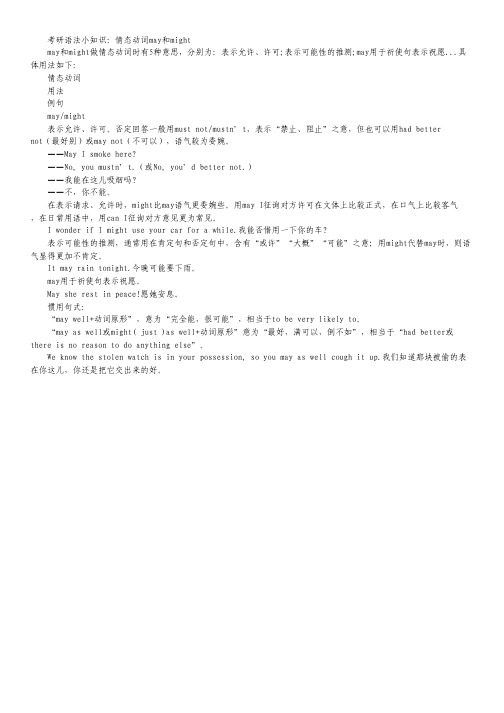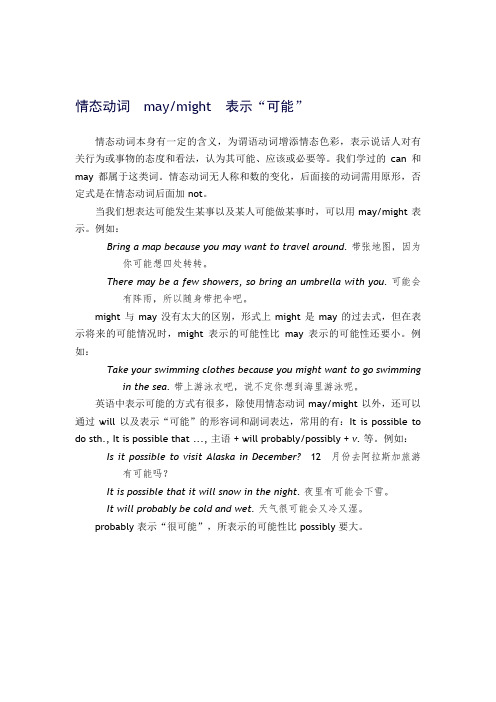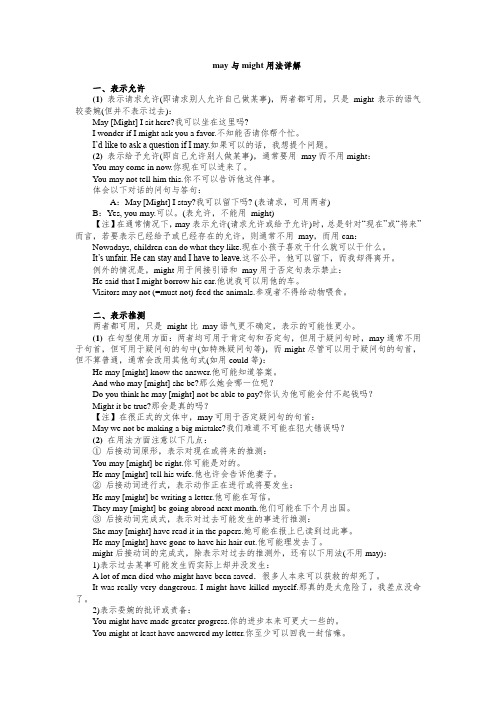2014年高考高中英语知识点详解及训练(84):情态动词may、might +完成时
- 格式:doc
- 大小:41.00 KB
- 文档页数:3

考研语法小知识:情态动词may和might may和might做情态动词时有5种意思,分别为:表示允许、许可;表示可能性的推测;may用于祈使句表示祝愿...具体用法如下: 情态动词 用法 例句 may/might 表示允许、许可。
否定回答一般用must not/mustn’t,表示“禁止、阻止”之意,但也可以用had betternot(最好别)或may not(不可以),语气较为委婉。
——May I smoke here? ——No, you mustn’t.(或No, you’d better not.) ——我能在这儿吸烟吗? ——不,你不能。
在表示请求、允许时,might比may语气更委婉些。
用may I征询对方许可在文体上比较正式,在口气上比较客气,在日常用语中,用can I征询对方意见更为常见。
I wonder if I might use your car for a while.我能否借用一下你的车? 表示可能性的推测,通常用在肯定句和否定句中,含有“或许”“大概”“可能”之意;用might代替may时,则语气显得更加不肯定。
It may rain tonight.今晚可能要下雨。
may用于祈使句表示祝愿。
May she rest in peace!愿她安息。
惯用句式: “may well+动词原形”,意为“完全能,很可能”,相当于to be very likely to。
“may as well或might( just )as well+动词原形”意为“最好,满可以,倒不如”,相当于“had better或there is no reason to do anything else”。
We know the stolen watch is in your possession, so you may as well cough it up.我们知道那块被偷的表在你这儿,你还是把它交出来的好。


1. 表示允许(1) 表示请求允许(即请求别人允许自己做某事),两者都可用,只是might 表示的语气较委婉(但并不表示过去)。
如:May I come round in the morning? 我早上来行吗?I wonder if I might use your phone. 不知可否用一下你的电话。
I’d like to ask a question if I may. 如果可以的话,我想提个问题。
(2) 表示给予允许(即自己允许别人做某事),只用能may而不能用might。
如:You may stop now. 你现在可以停下来了。
You may leave when you’ve finished. 你做完以后就可以走。
You may not tell him this. 你不可以告诉他这件事。
体会以下对话的问句与答句:A:May [Might] I stay? 我可以留下吗?(表请求,可用两者)B:Yes, you may. 可以。
(表允许,不能用might)注意,might 表示允许通常不表示过去,但是在间接引语(即宾语从句)中可以用作may 的过去式来转述已给予的允许。
如:She said that he might take her dictionary. 她说他可以拿她的词典去用。
2. 表示推测两者都可用,只是might 比may 语气更不确定,表示的可能性更小(注意此时的might并不表过去)。
在句型使用方面:may通常用于肯定句或否定陈述句,一般不用于疑问句(疑问句中用can, 参见can),而might 则可用于肯定句、否定句或疑问句。
在用法方面注意以下几点:(1) 后接动词原形,表示对现在或将来的推测。
如:He may [might] be in his office now. 他现在说不定在办公室里。
Might he know the answer? 他可能知道答案吗?(2) 后接动词进行式,表示动作正在进行或将要发生。

情态动词may/might表示“可能”情态动词本身有一定的含义,为谓语动词增添情态色彩,表示说话人对有关行为或事物的态度和看法,认为其可能、应该或必要等。
我们学过的can 和may 都属于这类词。
情态动词无人称和数的变化,后面接的动词需用原形,否定式是在情态动词后面加 not。
当我们想表达可能发生某事以及某人可能做某事时,可以用 may/might 表示。
例如:Bring a map because you may want to travel around. 带张地图,因为你可能想四处转转。
There may be a few showers, so bring an umbrella with you. 可能会有阵雨,所以随身带把伞吧。
might 与 may 没有太大的区别,形式上 might 是 may 的过去式,但在表示将来的可能情况时,might 表示的可能性比may 表示的可能性还要小。
例如:Take your swimming clothes because you might want to go swimming in the sea. 带上游泳衣吧,说不定你想到海里游泳呢。
英语中表示可能的方式有很多,除使用情态动词 may/might 以外,还可以通过 will 以及表示“可能”的形容词和副词表达,常用的有:It is possible to do sth., It is possible that ..., 主语 + will probably/possibly + v. 等。
例如:Is it possible to visit Alaska in December?12月份去阿拉斯加旅游有可能吗?It is possible that it will snow in the night. 夜里有可能会下雪。
It will probably be cold and wet. 天气很可能会又冷又湿。

情态动词知识点总结高中情态动词是英语中一个重要的语法现象,它们能够表达说话者的情感、态度、意愿等,以及表达说话者对事件的推测、猜测、可能性等。
了解情态动词的用法,能够帮助我们更准确地表达自己的意思,也有助于我们理解他人的意图。
本文将对情态动词的概念、用法、以及常见的情态动词进行总结和归纳,以便于读者更深入地理解情态动词的使用。
一、情态动词的概念情态动词(Modal Verb)是一类特殊的助动词,用来表示说话者的情感、态度、意愿等,以及表达说话者对事件的推测、猜测、可能性等。
情态动词通常用于句子的前面,后面跟动词原形,用来构成不同的语法结构和表达不同的含义。
英语中常见的情态动词有can、could、may、might、must、shall、should、will、would、ought to等。
这些情态动词具有一些共同的特点,比如不能独立完成谓语,后面必须跟动词原形;在疑问句和否定句中,情态动词的位置要发生变化等。
二、情态动词的用法1. 表示能力和可能性can与could表示说话者的能力或者对某种事情的可能性,其中can用于现在时,could用于过去时。
比如:I can speak Spanish.(我会说西班牙语。
)She could swim when she was five.(她五岁的时候就会游泳。
)may与might也表示可能性,may 用于现在时,might 用于过去时。
比如:It may rain tomorrow.(明天可能会下雨。
)I thought she might come.(我以为她可能会来。
)2. 表示请求和建议will与would可以表示请求,will用于肯定句,would用于否定句和疑问句。
比如:Will you please help me?(你能帮帮我吗?)I would like to go with you.(我想和你一起去。
)shall与should也可以表示请求或者建议,should更多地表示建议。

may与might用法详解一、表示允许(1)表示请求允许(即请求别人允许自己做某事),两者都可用,只是might表示的语气较委婉(但并不表示过去):May [Might] I sit here?我可以坐在这里吗?I wonder if I might ask you a favor.不知能否请你帮个忙。
I’d like to ask a question if I may.如果可以的话,我想提个问题。
(2)表示给予允许(即自己允许别人做某事),通常要用may而不用might:You may come in now.你现在可以进来了。
You may not tell him this.你不可以告诉他这件事。
体会以下对话的问句与答句:A:May [Might] I stay?我可以留下吗? (表请求,可用两者)B:Yes, you may.可以。
(表允许,不能用might)【注】在通常情况下,may表示允许(请求允许或给予允许)时,总是针对“现在”或“将来”而言,若要表示已经给予或已经存在的允许,则通常不用may,而用can:Nowadays, children can do what they like.现在小孩子喜欢干什么就可以干什么。
It’s unfair. He can stay and I have to leave.这不公平,他可以留下,而我却得离开。
例外的情况是,might用于间接引语和may用于否定句表示禁止:He said that I might borrow his car.他说我可以用他的车。
Visitors may not (=must not) feed the animals.参观者不得给动物喂食。
二、表示推测两者都可用,只是might比may语气更不确定,表示的可能性更小。
(1)在句型使用方面:两者均可用于肯定句和否定句,但用于疑问句时,may通常不用于句首,但可用于疑问句的句中(如特殊疑问句等),而might尽管可以用于疑问句的句首,但不算普通,通常会改用其他句式(如用could等):He may [might] know the answer.他可能知道答案。
【英语】2014年高考英语语法讲解——情态动词英语语法在英语学习中比较重要,也是每年高考英语必考点。
今天起,小编将陆续发布如何学习高考英语语法,大家可以跟随日志内容进行学习。
今天教你学“情态动词”!希望高考直通车认证空间(QQ号80796072)为你提供的内容对你备考2014年高考英语作文有所帮助!情态动词概述:情态动词表示说话人的情感态度。
它有一定的实在词义(如:能、会、可能、以前、最好、宁愿),只有谓语特性,必须和其他动词一起构成谓语。
中学阶段常见的情态动词:情态动词: can(could) may(might) must will(would) shall should ought to had better would rather need dare与情态动词相关的短语:be able to have to used to情态动词的固定谓语结构:情态动词+(不带to)动词不定式形式do例如:must + be donemust + be doingmust + have donemust + have been donemust + have been doing注意:ought (to)和used ( to)例外,动词不定式要带上”to”一、情态动词的用法:1.can1)表示能力“能够,会”She can drive, but she can’t ride a bicycle.Can you give me a lift to the station?2)表示对现在动作或状态进行主观的猜测“可能、会”,或表示惊异,怀疑,不相信等态度,主要用在否定句、疑问句或感叹句中。
例如:He can’t have a lot of money.Can it be that it was I, not he, who was mistaken?How can you be so careless!3)表示客观可能性“可能”,可用于肯定句As a human being, anyone can make a mistake.The temperature can fall to -60°C that is 60°C below freezing.4)表示允许“可以”,意思与may 相近,主要用在口语中Can I have a look at your copy of China Daily?This sort of thing can’t go on .5)构成下列特殊句式:①cannot /can never …too … 或cannot …enough越…越好;非常......One cannot be too careful.I cannot thank you enough.You can’t praise him too highly.②cannot help doing …/cannot help but do …/cannot but do …禁不住;不由得;不得不I cannot help admiring the picture whenever I look at it.When a close friend dies, you cannot but feel sad.2. could1)表示能力,指的是过去时间In those days few workers could support their family .I couldn’t follow the teacher in class.2)表示允许,指的是过去时间She asked whether she could take the books out of the reading-room.3)表示可能,可以指过去时间;也可以指现在时间,表示语气缓和I didn't think the story could be true.But you mustn’t smoke while you’re walking around in the bush either. You could start a fire.He looks young .He couldn’t be over fifty .他看起来很年轻,他不可能超过五十岁.4)比较委婉客气地提出问题或陈述看法,指的是现在时间Could I see your license?I have a few friends. I could ring to see if they’re free .Can(could)与be able toCan (could)和be able to表示能力时意思上没有区别.但can 只有现在式和过去式,而be able to 则有更多的形式.No one is able to do it. = No one can do it.Will you be able to come tonight?I’m sorry I haven’t been able to answer your letter.She said she had not been able to come earlier.但是,在表示成功地完成某一具体动作时用be able to 来表示。
would : 1. 表 will 的过去 ,用于过去未来时2.表 "意向 ",愿意做某事3.虚构语气could: 1. 表 can 的过去 ,表过去的能力2表恳求 (委宛语气 )3.表猜想 :可能是 ...4.虚构语气should: 1. 表 shall 的过去 ,用于过去未来时,搭配第一人称2.表委宛的语气 : 应当做 ...3.虚构语气might: 1. may 的过去 ,表猜想 :可能是2.表允许 (委宛语气 )may:1. 表猜想 : 可能是think of shall 和2. 表允许想起 , 想到 ; 没有 think fromwill 的用法的用法一.1、 shall 用在第一、三人称,will用于第二人称表示“征采建议”。
Shall I go now?Shall we invite her, too?Will you help me with the work?Shall the reporters wait outside or what?2、 shall 表示依照规定有义务去做。
Passengers shall not talk with the driver while the bus is moving.3、 shall 用于全部人称,表示说话人的承诺、威迫、警示、命令等。
You shall have an answer by tomorrow.If he’ s good, he shall have a new watch for Christma.If you children don’ t do as I tell you, you shan ’ t go to the party. 4、 would 能够表示过去的习惯(would 可表示频频发生的动作或某种偏向。
used to 表示过去的习惯动作或状态,重申此刻已不存在)He would come to see me on Sunday when he was here.The dog would lie there in the sun all afternoon.When we were children, we would go skating every winter.5、 will 能够表示“愿意” ,而非未来 :I will pay you for it.我会付给你钱买下它的。
高中英语知识点大全(84):情态动词may/might +完成时1、manage vt. 经营;设法;对付She managed the house very well. 她把家管理得很好。
We managed to finish the work ahead of time. 我们设法提前完成了任务。
I shan’t be able to manage without help.没有人帮助,我无法办到。
[辨析] manage to do sth. /try to do sth.manage to do sth.意为“设法完成或做到某事”,强调已达到目的或出现了结果,含“成功”之意。
try to do sth. 意为“试图或尽力做某事”,多表示一种企图或决心,而不表示一定成功。
如:we’ve managed to make up for the lost time.我们设法把失去的时间补了回来。
He tried to pass the examination,but failed. 他努力想通过考试,但没成功。
He managed to organize a live concert. = He succeeded in organizing a live concert.他设法组织了一次现场直播的音乐会。
2、livelive by it 赖……为生;以……为生(不可用于被动语态)Live by(one’s)pen 以笔耕为生live through(it) 活过,度过……而不死(不可用于被动语态) live out 活着,熬过live…life过着……生活 live a hard life过着艰苦的生活 live a miserable life过着悲惨的生活live a happy life 过着愉快的生活 live a quiet life过着安静的生活Einstein lived the rest of his life quietly in the USA. 爱因斯坦在美国安静地度过了他的余生。
高中英语知识点大全(84):情态动词may/might +完成时1、manage vt. 经营;设法;对付
She managed the house very well. 她把家管理得很好。
We managed to finish the work ahead of time. 我们设法提前完成了任务。
I shan’t be able to manage without help.没有人帮助,我无法办到。
[辨析] manage to do sth. /try to do sth.
manage to do sth.意为“设法完成或做到某事”,强调已达到目的或出现了结果,含“成功”之意。
try to do sth. 意为“试图或尽力做某事”,多表示一种企图或决心,而不表示一定成功。
如:
we’ve managed to make up for the lost time.我们设法把失去的时间补了回来。
He tried to pass the examination,but failed. 他努力想通过考试,但没成功。
He managed to organize a live concert. = He succeeded in organizing a live concert.
他设法组织了一次现场直播的音乐会。
2、live
live by it 赖……为生;以……为生(不可用于被动语态)Live by(one’s)pen 以笔耕为生
live through(it) 活过,度过……而不死(不可用于被动语态) live out 活着,熬过
live…life过着……生活 live a hard life过着艰苦的生活 live a miserable life过着悲惨的生活
live a happy life 过着愉快的生活 live a quiet life过着安静的生活
Einstein lived the rest of his life quietly in the USA. 爱因斯坦在美国安静地度过了他的余生。
The working people are living a happy life now. 劳动人民过着幸福的生活。
3、“情态动词may/might +完成时”的结构的用法:
①may/might + have + 过去分词,表示推测过去某动作“可能”发生了。
如:
I can’t find my sunglasses, I may/might have left them at the restaurant yesterday.
一般来说,may和might两者意思上没什么区别,只是may比might表示的可能性大些。
如:
He may have heard of it from Jack.
He might have heard of it from Jack.
在下列情况下,may和might 用法有区别:
句子的主要动词是现在时,间接引语中用may/might;
句子的主要动词是过去时,间接引语中只用might.如:
He says that she may/might have misunderstood him.
He said that she might have misunderstood him.
②might + have + 过去分词,表示对本来可能发生而实际并未发生的动作的感叹或遗憾含有“责备”、“抱怨”之意,而may+完成时无此含义。
如:
You might have told us earlier.
This medicine might have cured your cough.。